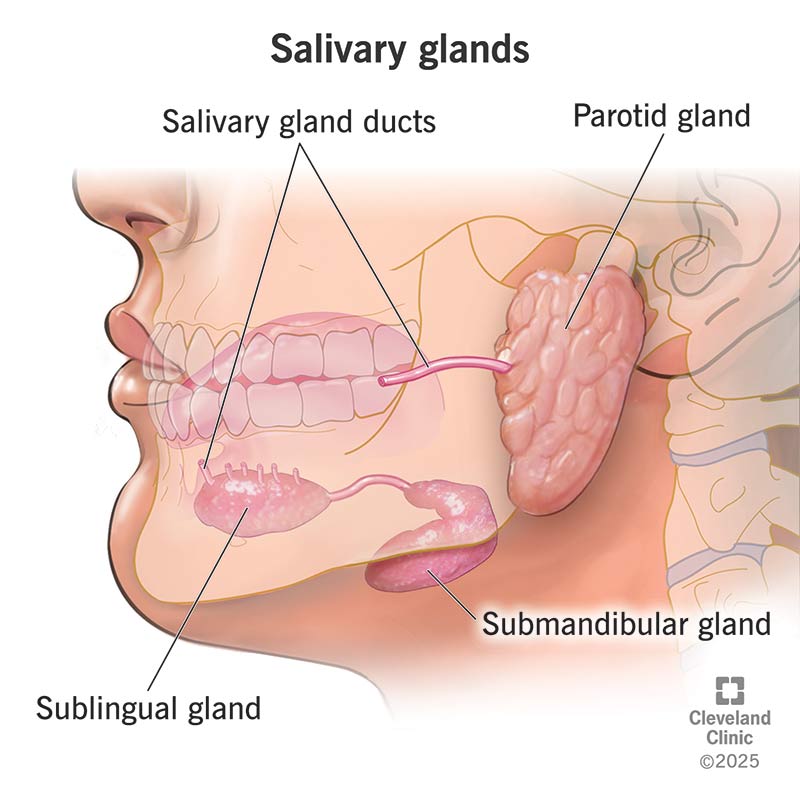Your salivary glands make saliva that lubricates your mouth. They help you swallow, digest food and protect your teeth from bacteria. Conditions like salivary gland neoplasms (tumors) can affect these glands. Common symptoms of salivary gland disorders include dry mouth, fever or a lump in your cheek or under your chin.
Advertisement
Cleveland Clinic is a non-profit academic medical center. Advertising on our site helps support our mission. We do not endorse non-Cleveland Clinic products or services. Policy

Image content: This image is available to view online.
View image online (https://my.clevelandclinic.org/-/scassets/Images/org/health/articles/23462-salivary-glands)
Your salivary glands are small organs in your mouth that make saliva (spit). The saliva that the glands make keeps your mouth and throat moist. It also helps you swallow and digest food.
Advertisement
Cleveland Clinic is a non-profit academic medical center. Advertising on our site helps support our mission. We do not endorse non-Cleveland Clinic products or services. Policy
You have several types of salivary glands, including:
Your salivary glands’ main job is to make lots of saliva (spit). Consider this: if you’re an adult, your salivary glands make about one to two liters (one to two quarts) of saliva every day. Over a year, that’s enough fluid to fill a bathtub. All that saliva works to support your oral health and overall health. For example, saliva:
The different glands and locations are:
Your parotid gland has two sections: The superficial section on top of your facial nerve and the deep section below the nerve. Your salivary glands are made of a group of specialized cells that release enzymes and mucus that help your body digest food.
Advertisement
The three major salivary glands are different sizes:
Your minor salivary glands measure about 2 millimeters or less than 1/10 of an inch.
Several conditions and disorders can affect your salivary glands. Common conditions and disorders are:
Salivary gland dysfunction means your salivary glands don’t work as they should. In most cases, this means that your salivary glands don’t make enough saliva. Several conditions and factors may cause your saliva supply to dry up (chronic dry mouth). These include:
The primary symptom of salivary gland conditions is dry mouth. Other symptoms include:
Salivary stones can clog or block your salivary glands. You may be able to get rid of the stone by:
The stones may cause infections that cause pain and make the skin overlying your gland become very red and inflamed. Or they may ooze pus from the ducts that drain the gland. You should talk to a healthcare provider if you think you have an infection from a salivary stone.
Your salivary glands are small organs with a big job. They make saliva that helps you digest food and keep your teeth clean and in good health. Talk to a healthcare provider if you have dry mouth that doesn’t go away. Swelling and pain in your face and jaws are other reasons to talk to a provider. They’ll find out what’s going on with your salivary glands and recommend treatment.
Advertisement

Sign up for our Health Essentials emails for expert guidance on nutrition, fitness, sleep, skin care and more.
Learn more about the Health Library and our editorial process.
Cleveland Clinic’s health articles are based on evidence-backed information and review by medical professionals to ensure accuracy, reliability and up-to-date clinical standards.
Cleveland Clinic’s health articles are based on evidence-backed information and review by medical professionals to ensure accuracy, reliability and up-to-date clinical standards.
Cleveland Clinic’s primary care providers offer lifelong medical care. From sinus infections and high blood pressure to preventive screening, we’re here for you.
